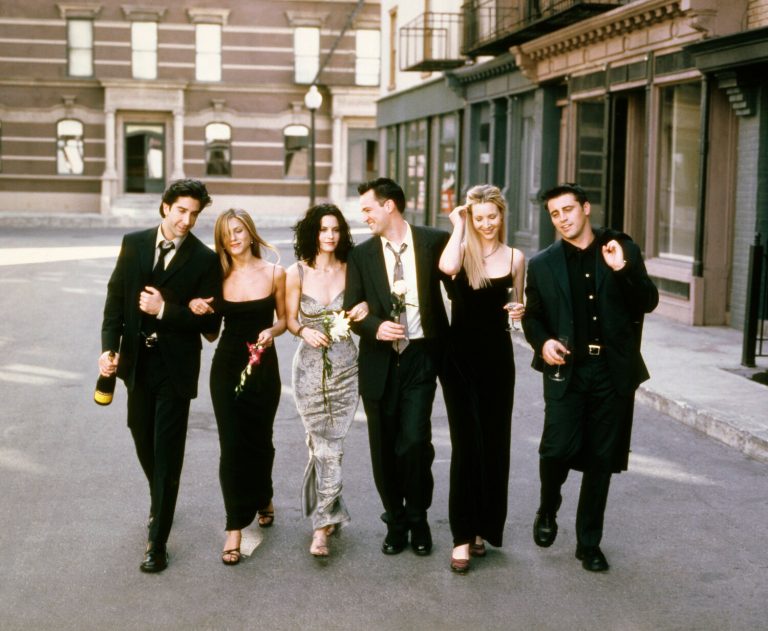When the shocking death of Matthew Perry first started rocketing across social media, the Friends-themed tributes and heartfelt messages from distraught fans quickly multiplied. They included posts with footage of Joey and Chandler hugging, and then Joey asking when they would see each other again. We saw tear-inducing montages set to a dreamy cover version of the Friends theme song, and endless snippets of people’s favorite scenes with Perry, who was found dead at his home at the too-young age of 54 and who will always be remembered for his work on Friends as the acerbic yet beloved Chandler Bing.
“We are devastated to learn of Matthew Perry’s passing,” the official Friends account posted on social media. “He was a true gift to us all. Our heart goes out to his family, loved ones, and all of his fans.” Perry, who was cast in what would become his most famous role on Friends at the age of 24, was reportedly found unresponsive at his home in Los Angeles. For his fans who’d followed his long battle with addiction, the news felt like a worst fear realized.

For whatever reason, I was never much of a Friends fan, though I certainly appreciated it as a massive pop culture touchstone (and I do have a soft spot for sitcoms). When I heard the news about Perry, though, I felt awful nonetheless, because it reminded me of two things: One is that, on my very first date, a girl and I went to the theater to see Fools Rush In, a 1997 rom-com starring Perry and Salma Hayek. I don’t remember very much about the date, but I do remember that it was a decent movie — and, funnily enough, Perry would later say it was his favorite-ever film role.
The second thing Perry’s death reminded me of was how much I enjoyed his work on NBC’s one-season 2006 drama Studio 60 on the Sunset Strip, created by Aaron Sorkin and featuring Perry as Matt Albie — an executive producer for an SNL-like variety show.
Even after all this time, the show still enjoys a 93% audience score on Rotten Tomatoes. It’s not available to stream anywhere, but you can rent or buy each episode from iTunes and Amazon. The show was a flop, at least in my opinion, mostly because of Sorkin — his excesses are in full flower here, which is to say that if you already found him preachy, then Studio 60 is definitely not the show for you. Of course, the thing about the creator of The West Wing is that his bad work so often lives side-by-side with sporadic transcendence. Which is to say, the highs in Studio 60 are very high indeed.
And that starts with the home run of a pilot episode, in which Perry’s Albie and Bradley Whitford’s Danny Tripp have been brought back to take over the moribund TV show. It’s a great episode, and it’s great fun to see the behind-the-scenes workings of a big production for the small screen. D.L. Hughley, a member of the fictitious show’s cast, warms up the audience before the taping, explaining that it’s the show’s 20th season and what everyone will see first is a cold open, followed by the main credits.
Workers wearing headsets scurry around checking lists, making preparations.
Remember what I said about Sorkin? You barely have to wait two minutes until he can’t help himself, writing a character in the control room muttering about how “living where there’s free speech means sometimes you get offended.” That comment is part of a larger conversation about an edgy sketch that’s just been cut and needs to be replaced by something extremely un-funny.
The show’s executive producer has a meltdown live on-air, which is what precipitates bringing in Albie and Tripp to pick up the pieces. And it’s absolute gold watching Perry and Whitford banter together during and around the show-within-a-show, with some of that same West Wing-style walk-and-talk dialogue. Perry, especially, was sublime. As a writer, I was drawn to so many things about his performance here. He nailed the obsessiveness, the perfectionism, the horror stemming from an impending deadline, the rush, and the spurts of creativity. For Studio 60, Perry traded Chandler’s snark for the earnestness of a striver.
“What are you smiling about?” Whitford’s Tripp asks Perry’s character at one point.
“Nice studio. It’s a great studio, with an incredible history. The people who’ve had this stage …”
“You like it?
“Yeah.”
“Good, ’cause we live here now.”
For me, Perry still lives there — in Matt Albie’s fictional Studio 60 office above a soundstage, with a giant digital clock on the wall counting down until the next episode. There are no demons to confront, no addictions to outrun. He’s got his work, his friends, and life is good.








